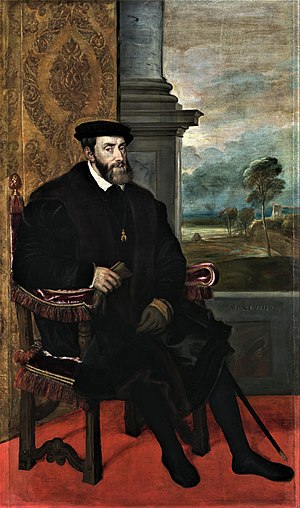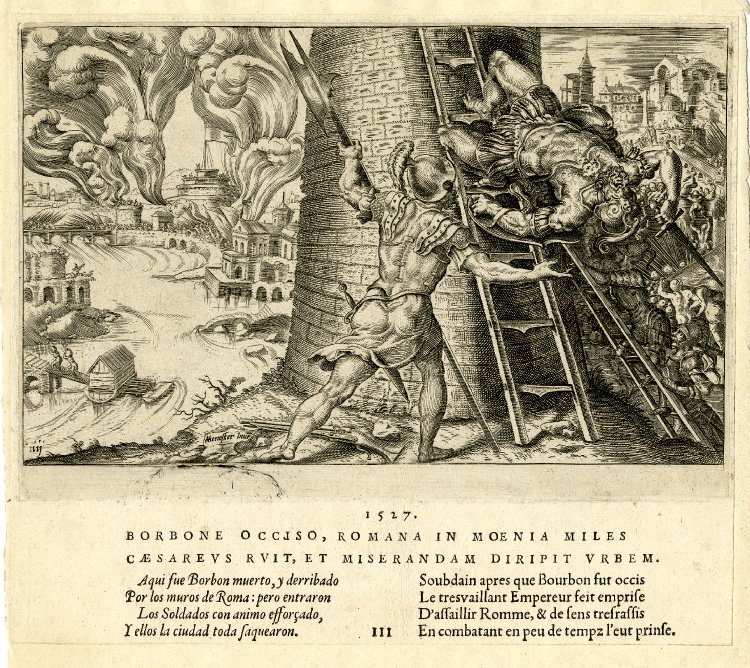Summary and Impression of Hiroshi Emura's "Karl V: Habsburg Glory Days" - Recommended work to learn about the life of Karl V, King of Spain at the height of his reign, and the situation in Western Europe at the time.
The book introduced here is "Karl V: Habsburg Glory Days" by Hiroshi Emura, published by Kawade Shobo Shinsha in 2013.
Let's take a quick look at the book.
With this man, the Habsburgs entered their heyday. After reigning as the young King of Spain and holding the imperial crown, he did not stop at Europe, but extended his reach as far as Africa in his days of warfare and glory. However, the twilight of the royal family and himself was quietly approaching. A masterpiece of critical biography depicting the Habsburgs' last days filled with light.
AmazonProducts Page.

The book will be about King Carl V of Spain, who was active during the heyday of the Habsburgs.
I picked up this book in an earlier postMasumi Ishinabe, "Rome of the Popes," a masterpiece that connects 15th- to 17th-century Roman art with the historical background of the Vatican, and the impact of the Roman canonization of 1527!"But as I told you, it was the incident of "Sacco di Roma" (The Plunder of Rome) that started it all.

It was an incredible incident in 1527 when the Holy Roman Empire's army broke into Rome and committed all manner of violence and looting from the holy city of Vatican City.
The king of the Holy Roman Empire at that time was the famous Carl V, who was also the King of Spain.
Carl V: The Glorious Days of the Habsburgs" is a detailed look at the very same Carl V.
In his "Afterword," the author describes this work as follows
Even Japanese who are not interested in Western history must have at least heard of King Karl V. For example, if you open any of the fifteen textbooks on world history published today, you will find the name of Karl V in every one of them. For example, if you open any of the fifteen textbooks on world history published today, the name of Karl V is mentioned without exception. Nevertheless, in Japan, there are almost no serious biographies or research books on this unprecedented emperor. The only book available is "Karl V" by Henri Laperre (translated by Someida Hideto) in the Xeju bunko (Hakusuisha). I have long thought that the achievements of this monarch should be more widely known in Japan.
Especially when looking at the current European situation, especially as the idea of "one Europe" is becoming more and more entrenched, and the European Community (EC) is about to establish a common currency and even a common foreign policy, it is quite significant to recall the image of King Karl V.
This is not only because the emperor was born in Brussels, where the headquarters of the European Community is located today, in the year 150. Nor is it because he was the king of Spain, which was celebrating the 500th anniversary of Columbus' arrival in the New World in 1492. The reason why we are attempting to trace the life of King Karl V again, five hundred years later, is because the ideal he sought to realize was the harmony of all European nations and peoples. If we trace the origin of the idea that "Europe is one," we will eventually find this monarch.
Kawade Shobo Shinsha, Hiroshi Emura, Karl V: Habsburg Glory Days, p. 365-366
This "Afterword" was written in 1992, 30 years ago. At that time, the EC had just started, but now the EU is expanding rapidly. It is fair to say that the idea of "Europe as One" is gaining in importance.
It is very interesting that the origin of this philosophy can be traced back to King Carl V.
This book is a great book to learn about such a large object that will help you understand the history of Europe as a whole.
The commentary by Yoshio Kikuchi at the end of the book describes the book as follows
This book lovingly depicts the life of this rare emperor who madly continued to pursue the medieval idea of world unification as an empire. Hiroshi Emura, the author of "The Habsburgs" and "The Women of the Habsburgs" published by Kodansha Gendai Shinsho, brought the Habsburg boom to our reading circles about 20 years ago, and has since published "The Last Knight of the Middle Ages: Biography of Emperor Maximilian I," "Maria Theresa and Her Times" ("Maria Theresia: The Last Knight of the Middle Ages"), "The Habsburgs and the Habsburgs. Maria Theresa and Her Times" ("Maria Theresa, the Only Empress of the Habsburgs," Kawade Bunko), and "Franz Joseph: The Last Emperor of the Habsburgs" ("Franz Joseph: The Last Emperor of the Habsburgs," Kawade Bunko).
By the way, when writing a biography of a certain person, if you put too much love and affection into your writing, your brush may sometimes dance a little. However, Hiroshi Emura never makes such a mistake. He keeps a thorough distance from his subject.
But even so, why is it that, on first reading, one can sense a hint of the author's affection for King Karl V?
Karl believed that bringing together the Christian world was his noble mission. Or perhaps it was a beautiful and too grandiose misconception. Such a thing could never happen. However, whether he was mistaken or not, the fact that Karl thought so is nothing other than his attempt to embody the imperial ideals of medieval Europe. In this, the author saw in Karl V an emperor like no other emperor of all time. Perhaps the author was moved by Karl's life in pursuit of the "Habsburg glory days. At the same time, he decided to trace Karl's life calmly and precisely. In this way, we are able to enjoy at the same time the author's passionate feelings and the certainty of his brushstrokes, which are the result of his distance from his subject. Readers should taste it, too!
Kawade Shobo Shinsha, Hiroshi Emura, Karl V: Habsburg Glory Days, p. 377-378
Readers should taste it too!"
This is exactly what it comes down to.
It was just an exciting and interesting work. I found this book very helpful to learn more about the Sacco di Roma case. I would highly recommend this work.
The above is "Hiroshi Emura's "Karl V: The Glorious Days of the Habsburgs" - A recommended work to learn about the life of King Karl V, the king of Spain in his heyday, and the situation in Western Europe at that time.
Click here to read the previous article.
Related Articles







































